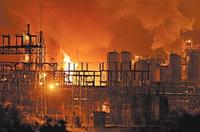-
U.S. chemical industry comes out swinging against new Senate plant security bill

Senator Frank Lautenberg (D-New Jersey) introduced a 107-page chemical plant safety bill which goes further than a similar bill — HR-2868 — approved by the House last November; Lautenberg’s bill requires the highest-risk facilities replace the most toxic and volatile chemicals they use with inherently safer technology (IST); it also set a provision, known as private right of action (PRA), which would allow citizens to file suit in federal court against DHS to force enforcement against a specific facility, and would allow private citizen petitions to DHS to demand federal investigation of suspected security shortcomings at particular sites
-
-
Brazil considers bulletproofing schools to protect students in "at-risk areas"
Teachers call for more protection in drug-gang areas after stray bullet hits an 11-year old student in the heart during math lesson; city authorities are currently studying plans to introduce reinforced walls and bulletproof windows in order to protect an estimated 100,000 students and 5,000 teachers who study and work in “at-risk areas”
-
-
Malicious virus targets SCADA systems

Supervisory Control and Data Acquisition, or SCADA, stands for large-scale distributed remote processing systems that gather data in real time to control critical industrial, infrastructure, or facility processes and equipment; SCADA is used to control U.S. critical infrastructure — power plants, oil and gas refining, telecommunications, transportation, dams, water, waste control, and more; Siemens is warning customers of a new and highly sophisticated virus that targets SCADA systems; these systems are typically not connected to the Internet for security reasons, but this virus spreads when an infected USB stick is inserted into a computer
-
-
DHS initiates first enforcement action of chemical plant safety regulations

DHS initiated its first enforcement actions against U.S. chemical facilities under federal anti-terrorism law; the department sent letters to 18 chemical facilities warning that their failure to comply with safety regulations may result in heavy fines or worse; the administrative orders sent to the facilities represent the final step before the department begins prosecution; under the law, DHS can assess fines of up to $25,000 per day for failure to comply; in addition, the law gives the department authority to shut down a chemical facility if its owners fail to respond to DHS requirements for security improvements; for security reasons, DHS declined to identify the 18 facilities or to indicate the types of sites involved or even where they are generally located
-
-
UTSA's cyber security center moves into new home
The Institute for Cyber Security Center for Infrastructure Assurance and Security at the University of Texas at San Antonio is moving to a new home on campus; Congress, DHS, and the Defense departments have thrown their money behind UTSA, which the New York Times has named one of the best places to get training as a “cyber sleuth”
-
-
Software to cut millions from nuclear clean-up bill
New software lets planners work out the best way of breaking up and packing contaminated equipment while minimizing workers’ radiation exposure. It also shows in minute detail how radioactive waste can be stored in the smallest possible space, reducing the number of long-term storage containers needed
-
-
Sector Report for July 12, 2010: Infrastructure
This report contains the following stories.
-
-
Experts: securing U.S. critical infrastructure against cyberattack not feasible
Experts say securing the U.S. power grid and other computer systems that operate the nation’s critical infrastructure against cyberattack is unrealistic, because companies cannot afford to check if suppliers have provided trustworthy products
-
-
U.S. nuclear safety agency unveils new data, physical security controls
NNSA the rollout of new information and physical security controls aimed at balancing efficiency and safety; officials said, though, that the implementation of cybersecurity improvements is about a year behind the progress the agency has made on physical protection
-
-
Transportation leaders warn of U.S. infrastructure woes
The U.S. transportation system that supports the movement of freight is facing a crisis: in ten years, an additional 1.8 million trucks will be on the road in the United States; in twenty years, one truck will be added for every two today; major highway bottlenecks already are adding to the cost of food and other goods for American consumers
-
-
New critical infrastructure resilience strategy for Australia
Australia’s attorney-general Robert McClelland has launched the Australian Government’s Critical Infrastructure Resilience Strategy
-
-
Leaking well may be sealed ahead of schedule
The Deepwater Horizon may be sealed a month or so ahead of schedule — during the second half of July rather than the second half of August — owing to three positive developments: one of two relief wells being drilled will be in a position to engage in “bottom kill” in several days; the containment ship Helix Producer, capable of capturing an additional 53,000 barrels of oil a day, is on station; BP is pressing ahead with plans to swap the current leaky containment cap with a new, no-leak, bolt-down cap
-
-
U.K. approves well-capping and containment study; new prevention, mitigation solutions sought
In response to BP’s Gulf disaster, the U.K. offshore oil and gas advisory group charged its technical review group to proceed with developing new solutions for preventing or mitigating similar catastrophes in the future; over the past twenty years nearly 7,000 wells have been successfully drilled in the U.K. continental shelf
-
-
Siemens's leak location and monitoring system reduces losses in drinking water supplies
Precise knowledge of water losses is essential for operating and planning the maintenance of drinking water networks efficiently; Siemens’s new solution not only continuously checks for leaks, but also pinpoints them automatically; this is done by setting up district metering areas, in which the inflows and outflows of water are measured by ultrasonic flow meters
-
-
Napolitano: private sector-government cooperation needed for chemical plant security
DHS secretary says federal-private collaboration is needed to secure the U.S. chemical plants; Napolitano said common-sense performance standards help protect chemical facilities against threats without compromising their operational characteristics or efficiency
-
More headlines
The long view
Falling Space Debris: How High Is the Risk I'll Get Hit?
An International Space Station battery fell back to Earth and, luckily, splashed down harmlessly in the Atlantic. Should we have worried? Space debris reenters our atmosphere every week.
Using Drone Swarms to Fight Forest Fires
Forest fires are becoming increasingly catastrophic across the world, accelerated by climate change. Researchers are using multiple swarms of drones to tackle natural disasters like forest fires.
Strengthening the Grid’s ‘Backbone’ with Hydropower
Argonne-led studies investigate how hydropower could help add more clean energy to the grid, how it generates value as grids add more renewable energy, and how liner technology can improve hydropower efficiency.
LNG Exports Have Had No Impact on Domestic Energy Costs: Analysis
U.S. liquified natural gas (LNG) exports have not had any sustained and significant direct impact on U.S. natural gas prices and have, in fact, spurred production and productivity gains, which contribute to downward pressure on domestic prices.
